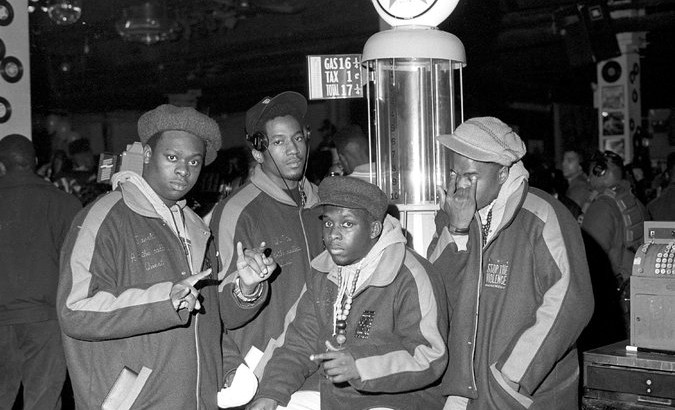The hip-hop world has been steaming this week with the incredibly exciting news that one final A Tribe Called Quest album will be coming out in just two weeks from now. According to a handwritten note distributed by Q-Tip, the album was recorded after the Paris bombings of November 2015, with enough completed before the untimely death of Phife Dawg earlier this year, that the release was ready to be fully realised.
In a fabulous new interview with the New York Times, Q-Tip has now revealed more details about the album, as well as a long discussion about his relationship with Phife Dawg, the creation of the last album, and having had to deal with his passing at just 45 years old.
Set for release next Friday, November 11, the album title is We Got It From Here, Thank You For Your Service, a title which sounds sentimental, and was initially conceived by Phife Dawg. As well as all four members of A Tribe Called Quest featuring on the album – Q-Tip, Phife Dawg, Jarobi White and Ali Shaheed Muhammad, special guests including Jack White, Kendrick Lamar, Stevie Wonder, Busta Rhymes, André 3000 and Sir Elton John will be adding their own flavours to the forthcoming record. This is huge news considering the calibre and respect that these names hold; André 3000 has certainly enjoyed one hell of a resurgence in 2016, while Jack White appeared on Beyoncé’s album earlier this year, and Kendrick Lamar, well, he’s Kendrick Lamar. And he was in Sydney on the night Phife Dawg died, leading the crowd in an emotional chant honouring the late legend.
The album was conceived and created well before Phife had any indication that his days might be numbered. It was their first new record in 18 years and they were incredibly excited about what it might entail.
After playing their first live TV performance in 15 years, the group were inspired to write a new record, and it wasn’t long before they set to it in Q-Tip’s studio. The studio, called “phenomenal” by Busta Rhymes, was reportedly decorated with ” bamboo floors and pink mood lights” to create a “warm aesthetic.” It was also something of a living museum, with equipment collected from across the music globe. The recording board had previously been used by Blondie and The Ramones, a tape reel used by Frank Zappa, and other equipment acquired from the Rolling Stones and Jimi Hendrix.
Interestingly, the group had decided that anyone involved in recording the album were required to actually visit the studio and work together as a group, which doesn’t always happen these days, considering that many artists simply record their music or features and send it away. “Everybody spat their rhymes in front of each other. We were throwing ideas around together,” said Busta Rhymes.
Jack White arrived without any equipment and began to use one of the guitars in the studio. Tip and Jack had met before, and were fans of each others’ work. “We really didn’t know what we were doing, it was just a ‘hurry up and press record’ kind of moment,” said Q-Tip.
Jack White has an ongoing relationship with hip-hop and many rappers, and it seems like it stretches far back to even his childhood. “They were trying to break new ground, and they had a musicologist’s attitude toward what they were doing with their samples,” he said. “I mean, you’ve got Can I Kick It? over a Lou Reed sample from Walk on the Wild Side. That really showed that they were miles and miles deeper than most other people in pop music.”
The album’s creation process was as exciting as ever, with a reinvigorated energy permeating through the studio walls and each artist involved. “I seen them laughing and joking and high-fiving, and you can just see that young, invigorated ‘we’re-just-getting-our-first-opportunity-to-do-this’ energy again!
“I hadn’t seen Phife that happy since we were kids.”
Q-Tip was emotional when he discussed finishing the album after Phife’s death. “Sometimes I just have to like take a break and walk away. It gets heavy. It doesn’t necessarily get sad, it just gets heavy. I literally feel the energy from him when I hear his voice.”
“I just want to celebrate him, you know?”
The interview can be read in full here. It also reveals that a completed Phife Dawg solo album should be coming out in 2017.
Image: New York Times / Al Pereira/Michael Ochs Archives, via Getty Images

